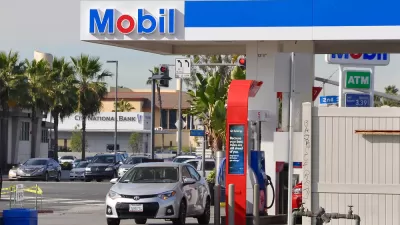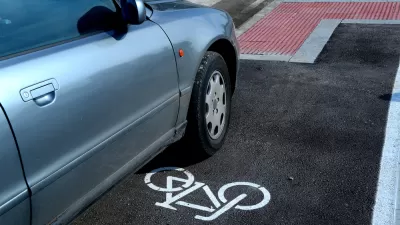While state legislatures and governors are struggling whether to raise state gas, sales, or income taxes or user fees to fund transportation projects, an arcane state board of five elected members voted 3-2 to increase CA's gas tax by 3.5 cents.
Add California to the short list of states that have chosen to ask drivers - rather than the general public or Prius or Leaf drivers, to pay a small increase in the gas tax to fund transportation programs.
As small as it may be, it may be enough to give the state the highest 'total' state gas tax when sales taxes are considered come July 1, according to the Associated Press. [See the Tax Foundation's State Gasoline Tax Rates effective Jan. 1, 2013. New York is #1 at $.506; CA at $.487]
While Virginia Governor Bob McDonnell is expected to make history this month by making his state the first to have no state gas excise (per-gallon) tax, opting to increase the general sales tax, charge a 3.5 percent wholesale tax on motor fuels and "double the registration fee on electric cars to $100 and applying it to alternative fuel and hybrid vehicles", some states are sticking to the traditional user fee known as the gas tax.
While it may be difficult to top the 10-cent gas tax increase signed by Wyoming Gov. Matt Mead on Feb. 15 - effective July 1, others may settle for smaller increases - like the 3.5-cent increase approved in California on March 1, also effective July 1.
But unlike Wyoming or Virginia, this gas tax increase did not go through a lengthy legislative process involving state lawmakers and the governor, potentially subject to supermajority thresholds as is the case in California, with elected leaders possibly concerned about the Taxpayer Protection Pledge (by Grover Norquist) they may have signed. Ron D. White explains.
Because of a complicated 2010 law, the (five-member California Board of Equalization) is required to make up for the (6)% in statewide sales tax revenue that was exempted when that law went into effect.
White is referring to what Kathleen Pender of the San Francisco Chronicle calls "a convoluted system for setting gasoline taxes in 2010 as a way to help fill a hole in the general fund that year." Pender writes:
The legislation lowered the sales tax rate on gasoline to 2.25 from 8.25 percent and raised the excise tax rate to 35.3 cents from 18 cents per gallon starting July 1, 2010. It required this so-called fuel tax swap to be revenue neutral, meaning the tax revenue generated by the two taxes combined should not change as a result of the swap. The legislation required the board to adjust the excise tax by March 1 each year to achieve revenue neutrality, with the change taking effect July 1.
White writes that the "five-member California Board of Equalization is an elected body whose members serve four-year terms. They are rarely in the news. The board voted 3 to 2 (March 1 as required by state law) for the excise tax rise. It could have chosen a smaller amount."
Bottom line: When the legislature in 2010 assigned fuel taxes to be adjusted in this manner, convoluted as it may be, it allowed a rather unknown, though elected statewide board to make these critical decisions.
While business reporters White and Pender picked up on the increase as did the Sacramento Bee and editorial board of The Desert Sun, the moderate tax increase was not subject to the media attention on a protracted legislative battle with heated debate would undoubtedly have received, similar to what happened in Virginia, Wyoming, Wisconsin and other states that are considering increasing transportation revenue.
Of course - that is not a fail-safe method for adjusting the gas tax, as was shown in Wisconsin when the legislature in 2006 voted to end the annual indexing (PDF) of the gas tax to the Consumer Price Index that had been done since 1985.
FULL STORY: Get ready for likely gas price increase when California taxes go up

Planetizen Federal Action Tracker
A weekly monitor of how Trump’s orders and actions are impacting planners and planning in America.

Maui's Vacation Rental Debate Turns Ugly
Verbal attacks, misinformation campaigns and fistfights plague a high-stakes debate to convert thousands of vacation rentals into long-term housing.

Restaurant Patios Were a Pandemic Win — Why Were They so Hard to Keep?
Social distancing requirements and changes in travel patterns prompted cities to pilot new uses for street and sidewalk space. Then it got complicated.

In California Battle of Housing vs. Environment, Housing Just Won
A new state law significantly limits the power of CEQA, an environmental review law that served as a powerful tool for blocking new development.

Boulder Eliminates Parking Minimums Citywide
Officials estimate the cost of building a single underground parking space at up to $100,000.

Orange County, Florida Adopts Largest US “Sprawl Repair” Code
The ‘Orange Code’ seeks to rectify decades of sprawl-inducing, car-oriented development.
Urban Design for Planners 1: Software Tools
This six-course series explores essential urban design concepts using open source software and equips planners with the tools they need to participate fully in the urban design process.
Planning for Universal Design
Learn the tools for implementing Universal Design in planning regulations.
Heyer Gruel & Associates PA
JM Goldson LLC
Custer County Colorado
City of Camden Redevelopment Agency
City of Astoria
Transportation Research & Education Center (TREC) at Portland State University
Jefferson Parish Government
Camden Redevelopment Agency
City of Claremont





























